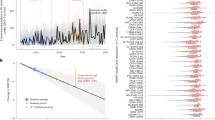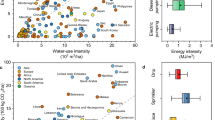Abstract
Existing estimates of optimal climate policy ignore the possibility that carbon tax revenues could be used in a progressive way; model results therefore typically imply that near-term climate action comes at some cost to the poor. Using the Nested Inequalities Climate Economy (NICE) model, we show that an equal per capita refund of carbon tax revenues implies that achieving a 2 °C target can pay large and immediate dividends for improving well-being, reducing inequality and alleviating poverty. In an optimal policy calculation that weighs the benefits against the costs of mitigation, the recommended policy is characterized by aggressive near-term climate action followed by a slower climb towards full decarbonization; this pattern—which is driven by a carbon revenue Laffer curve—prevents runaway warming while also preserving tax revenues for redistribution. Accounting for these dynamics corrects a long-standing bias against strong immediate climate action in the optimal policy literature.
This is a preview of subscription content, access via your institution
Access options
Access Nature and 54 other Nature Portfolio journals
Get Nature+, our best-value online-access subscription
$29.99 / 30 days
cancel any time
Subscribe to this journal
Receive 12 print issues and online access
$209.00 per year
only $17.42 per issue
Buy this article
- Purchase on Springer Link
- Instant access to full article PDF
Prices may be subject to local taxes which are calculated during checkout





Similar content being viewed by others
Data availability
All data used in our version of the model are archived53 and freely available at https://github.com/Environment-Research/revenue_recycling.
Code availability
All model code used to generate results and create figures for this article is archived53 and freely available at https://github.com/Environment-Research/revenue_recycling.
References
Anthoff, R. & Tol, R. The Climate Framework for Uncertainty, Negotiation and Distribution (FUND) Technical Description, Version 3.9 (Univ. of Notre Dame, 2014); https://www3.nd.edu/~nmark/Climate/Fund-3-9-Scientific-Documentation.pdf
Stern, N. Stern Review: The Economics of Climate Change (Her Majesty’s Treasury, 2006).
Nordhaus, W. D. & Boyer, J. Warming the World: Economic Models of Global Warming (MIT Press, 2000).
Nordhaus, W. D. Revisiting the social cost of carbon. Proc. Natl Acad. Sci. USA 114, 1518–1523 (2017).
Tol, R. The damage costs of climate change toward more comprehensive calculations. Environ. Resour. Econ. 5, 353–374 (1995).
Anthoff, D. & Tol, R. S. in Climate Change and Common Sense: Essays in Honour of Tom Schelling (eds Hahn, R. W. & Ulph, A.) 260–274 (Oxford Univ. Press, 2012).
Hahn, R. W. & Ulph, A. in Climate Change and Common Sense: Essays in Honour of Tom Schelling (eds Hahn, R. W. & Ulph, A.) Ch. 1 (Oxford Univ. Press, 2012).
Cullenward, D., Wilkerson, J. T., Wara, M. & Weyant, J. P. Dynamically estimating the distributional impacts of US climate policy with NEMS: a case study of the Climate Protection Act of 2013. Energy Econ. 55, 303–318 (2016).
Fawcett, A., McFarland, J., Morris, A. C. & Weyant, J. (eds) Special issue on EMF 32 study on US carbon tax scenarios Climate Change Econ. 9, https://www.worldscientific.com/toc/cce/09/01 (2018).
Goulder, L. H. & Hafstead, M. A. Tax reform and environmental policy: options for recycling revenue from a tax on carbon dioxide. Resources for the Future https://doi.org/10.2139/ssrn.2338210 (2013).
Goulder, L. H., Hafstead, M. A., Kim, G. & Long, X. Impacts of a Carbon Tax across US Household Income Groups: What Are the Equity-Efficiency Trade-Offs? (National Bureau of Economic Research, 2018).
Horowitz, J., Cronin, J.-A., Hawkins, H., Konda, L. & Yuskavage, A. Methodology for Analyzing a Carbon Tax (US Department of the Treasure, 2017).
Jorgenson, D. & Goettle, R. Double Dividend: Environmental Taxes and Fiscal Reform in the United States (MIT Press, 2013).
Mathur, A. & Morris, A. Distributional effects of a carbon tax in broader US fiscal reform. Energy Policy 66, 326–334 (2014).
Metcalf, G. E. Paying for Pollution: Why a Carbon Tax is Good for America (Oxford Univ. Press, 2018).
Murray, B. C., Bistline, J., Creason, J., Wright, E. & Kanudia, A. The EMF 32 Study on Technology and Climate Policy Strategies for Greenhouse Gas Reductions in the US Electric Power Sector: An Overview (Elsevier, 2018).
Rausch, S., Metcalf, G. E. & Reilly, J. M. Distributional impacts of carbon pricing: a general equilibrium approach with micro-data for households. Energy Econ. 33, S20–S33 (2011).
Sterner, T. Fuel Taxes and the Poor: The Distributional Effects of Gasoline Taxation and their Implications for Climate Policy (RFF Press, 2012).
Klenert, D. et al. Making carbon pricing work for citizens. Nat. Clim. Change 8, 669–677 (2018).
Klenert, D., Schwerhoff, G., Edenhofer, O. & Mattauch, L. Carbon taxation, inequality and Engel’s law: the double dividend of redistribution. Environ. Resour. Econ. 71, 605–624 (2018).
Carattini, S., Kallbekken, S. & Orlov, A. How to win public support for a global carbon tax. Nature 565, 289–291 (2019).
McCollum, D., Gomez Echeverri, L., Riahi, K. & Parkinson, S. SDG7: Ensure Access to Affordable, Reliable, Sustainable and Modern Energy for All (IIASA, 2017); http://pure.iiasa.ac.at/id/eprint/14621/1/SDGs-interactions-7-clean-energy.pdf
Nerini, F. F. et al. Mapping synergies and trade-offs between energy and the Sustainable Development Goals. Nat. Energy 3, 10–15 (2018).
Sustainable Development Goals (United Nations Department of Economic and Social Affairs, accessed 6 May 2020); https://sustainabledevelopment.un.org/sdgs
Davies, J. B., Shi, X. & Whalley, J. The possibilities for global inequality and poverty reduction using revenues from global carbon pricing. J. Econ. Inequal. 12, 363–391 (2014).
Franks, M., Lessmann, K., Jakob, M., Steckel, J. C. & Edenhofer, O. Mobilizing domestic resources for the Agenda 2030 via carbon pricing. Nat. Sustain. 1, 350–357 (2018).
Nordhaus, W. D. A review of the ‘Stern review on the economics of climate change’. J. Econ. Lit. 45, 686–702 (2007).
Stern, N. The economics of climate change. Am. Econ. Rev. 98, 1–37 (2008).
Dorband, I. I., Jakob, M., Kalkuhl, M. & Steckel, J. C. Poverty and distributional effects of carbon pricing in low- and middle-income countries—a global comparative analysis. World Dev. 115, 246–257 (2019).
Sterner, T. Distributional effects of taxing transport fuel. Energy Policy 41, 75–83 (2012).
Marron, D. B. & Maag, E. How to Design Carbon Dividends (SSRN, 2018).
Gardiner, S., Caney, S., Jamieson, D. & Shue, H. Climate Ethics: Essential Readings (Oxford Univ. Press, 2010).
Laffer, A. B. The Laffer curve: past, present, and future. Backgrounder 1765, 1–16 (2004).
Burke, M., Davis, W. M. & Diffenbaugh, N. S. Large potential reduction in economic damages under UN mitigation targets. Nature 557, 549–553 (2018).
IPCC Special Report on Global Warming of 1.5 °C (eds Masson-Delmotte, V. et al.) (WMO, 2018).
Bain, P. G., Hornsey, M. J., Bongiorno, R. & Jeffries, C. Promoting pro-environmental action in climate change deniers. Nat. Clim. Change 2, 600–603 (2012).
Bain, P. G. et al. Co-benefits of addressing climate change can motivate action around the world. Nat. Clim. Change 6, 154–157 (2016).
Bergquist, P., Mildenberger, M. & Stokes, L. C. Combining climate, economic, and social policy builds public support for climate action in the US. Environ. Res. Lett. 15, 054019 (2020).
Carattini, S., Carvalho, M. & Fankhauser, S. Overcoming public resistance to carbon taxes. WIREs Clim. Change 9, e531 (2018).
Marshall, G. et al. Guide to Communicating Carbon Pricing (World Bank, 2018).
Pahle, M. et al. Sequencing to ratchet up climate policy stringency. Nat. Clim. Change 8, 861–867 (2018).
Carattini, S., Baranzini, A., Thalmann, P., Varone, F. & Vöhringer, F. Green taxes in a post-Paris world: are millions of nays inevitable? Environ. Resour. Econ. 68, 97–128 (2017).
Budolfson, M. & Dennig, F. in Handbook on the Economics of Climate Change (eds Chichilnisky, G. et al.) 224–238 (Edward Elgar Press, 2020).
Budolfson, M. et al. Utilitarian benchmarks for emissions and pledges promote equity, climate, and development. Nat. Clim. Change 11, 827–833 (2021).
Parry, I., Black, S. & Roaf, J. Proposal for an International Carbon Price Floor Among Large Emitters (International Monetary Fund, 2021).
Cronin, J. A., Fullerton, D. & Sexton, S. Vertical and horizontal redistributions from a carbon tax and rebate. J. Assoc. Environ. Resour. Econ. 6, S169–S208 (2019).
Douenne, T. The vertical and horizontal distributive effects of energy taxes: a case study of a French policy. Energy J. 41, 231–253 (2020).
Fischer, C. & Pizer, W. A. Horizontal equity effects in energy regulation. J. Assoc. Environ. Resour. Econ. 6, S209–S237 (2019).
Carleton, T. et al. Valuing the Global Mortality Consequences of Climate Change Accounting for Adaptation Costs and Benefits (Univ. of Chicago, 2018).
Valuing Climate Damages: Updating Estimation of the Social Cost of Carbon Dioxide (National Academies Press, 2017).
Budolfson, M., Dennig, F., Fleurbaey, M., Siebert, A. & Socolow, R. H. The comparative importance for optimal climate policy of discounting, inequalities and catastrophes. Clim. Change 145, 481–494 (2017).
Dennig, F., Budolfson, M. B., Fleurbaey, M., Siebert, A. & Socolow, R. H. Inequality, climate impacts on the future poor, and carbon prices. Proc. Natl Acad. Sci. USA 112, 15827–15832 (2015).
Budolfson, M. et al. Climate action with revenue recycling has benefits for poverty, inequality, and wellbeing. Zenodo https://doi.org/10.5281/zenodo.5552749 (2021).
Nordhaus, W. D. Economic aspects of global warming in a post-Copenhagen environment. Proc. Natl Acad. Sci. USA 107, 11721–11726 (2010).
Technical Update on the Social Cost of Carbon for Regulatory Impact Analysis—Under Executive Order 12866 (Interagency Working Group on Social Cost of Carbon, United States Government, 2013).
Pindyck, R. S. Climate change policy: what do the models tell us? J. Econ. Lit. 51, 860–872 (2013).
Weyant, J. Some contributions of integrated assessment models of global climate change. Rev. Environ. Econ. Policy 11, 115–137 (2017).
World Income Inequality Database (UNU-WIDER, accessed 6 May 2020); https://www.wider.unu.edu/project/wiid-world-income-inequality-database
Acknowledgements
This article has received funding from the NAVIGATE project of the European Union’s Horizon 2020 research and innovation programme under grant no. 821124 (S.F., M. Fleurbaey, U.K., A.M., F.W. and S.Z.) and the NIEHS-funded HERCULES Center P30ES019776 (N.S.). We thank C. Burnham and the Climate Futures Initiative at Princeton University for support.
Author information
Authors and Affiliations
Contributions
M.B., F.D., F.E., U.K., K.K. and N.S. are co-lead authors and contributed equally to the study. M.B., F.D., D.K., F.E., M. Ferranna, U.K., K.K., A.M., N.S. and S.Z. designed the research. M.B., F.D., S.F., M. Ferranna, D.K., U.K., K.K., A.M. and S.Z. conducted the literature review on the distributional impact of a carbon tax. F.D., F.E. and K.K. conducted the modelling. F.D., K.K., S.F., M. Ferranna, M. Fleurbaey, D.K., U.K., A.M. and S.Z. led the social welfare and tax analysis. M.B. and N.S. wrote the first draft of the manuscript with contributions from U.K. and K.K. All authors interpreted the results and edited the manuscript.
Corresponding author
Ethics declarations
Competing interests
The authors declare no competing interests.
Additional information
Peer review information Nature Climate Change thanks Allen Fawcett and the other, anonymous, reviewer(s) for their contribution to the peer review of this work.
Publisher’s note Springer Nature remains neutral with regard to jurisdictional claims in published maps and institutional affiliations.
Supplementary information
Supplementary Information
Supplementary Discussion, Tables 1–4 and Figs. 1–15.
Supplementary Data
Individual studies and implied elasticities from literature review underpinning Fig. 1. Includes country, year, per capita GDP, implied elasticity (by our estimate) and citation information.
Rights and permissions
About this article
Cite this article
Budolfson, M., Dennig, F., Errickson, F. et al. Climate action with revenue recycling has benefits for poverty, inequality and well-being. Nat. Clim. Chang. 11, 1111–1116 (2021). https://doi.org/10.1038/s41558-021-01217-0
Received:
Accepted:
Published:
Issue Date:
DOI: https://doi.org/10.1038/s41558-021-01217-0
This article is cited by
-
Inequality repercussions of financing negative emissions
Nature Climate Change (2024)
-
Financing negative emissions leads to windfall profits and inequality at net zero
Nature Climate Change (2024)
-
Meat taxes in Europe can be designed to avoid overburdening low-income consumers
Nature Food (2023)
-
EU climate action through an energy poverty lens
Scientific Reports (2023)
-
How and When Environmental Transformational Leadership Enhances Employee Well-being: a Moderated Mediation Model
Employee Responsibilities and Rights Journal (2023)



